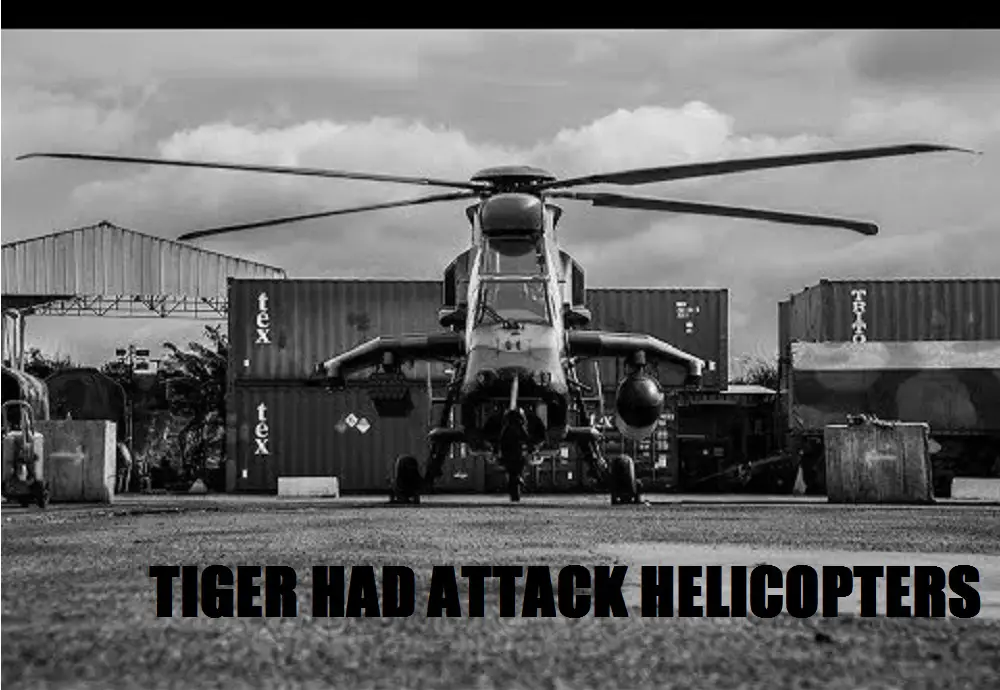The Eurocopter EC665 Tiger is a four-bladed, twin-engined attack helicopter manufactured by Eurocopter (now Airbus Helicopters), the successor company to Aérospatiale’s and DASA’s respective helicopter divisions. Following their languages, in Germany it is known as the Tiger; in France and Spain it is called the Tigre. The Tiger helicopter was developed for France and Germany in three configurations, UHT multi-role fire support for the German Army and HAD multi-role combat and HAP combat support for the French Army. The Tiger HAD is capable of undertaking a wide range of combat missions, including armed reconnaissance and surveillance, anti-tank and close air support, escort and protection of friendly assets; and can operate during day or night in all-weather conditions, and has been designed to include operations in the aftermath of nuclear, biological, or chemical warfare. The attack helicopter has proven its capabilities during operational deployments in Afghanistan, the Central African Republic, Libya and Mali.

The Tiger HAD has the distinction of being the first all-composite helicopter developed in Europe; even the earliest models also incorporate other advanced features such as a glass cockpit, stealth technology, and high agility to increase its survivability. The fuselage of the Tiger is made from 80% carbon fibre reinforced polymer and kevlar, 11% aluminium, and 6% titanium. The entire tail section is made of composites, including the single section tail boom. The rotors are composed of a fibre plastic composite material able to withstand combat damage and bird strikes. Improved variants have since entered service, outfitted with more powerful engines and compatible with a wider range of weapons. Amongst the Tiger’s notable qualities, it possesses very high levels of agility, much of which is attributed to the design of its 13-meter four-bladed hingeless main rotor; the Tiger can perform full loops and negative g manoeuvres. The Tiger can also be used in the maritime environment, able to operate from the decks of ships including frigates and during extreme weather conditions. Power is provided by a pair of FADEC-controlled MTU Turbomeca Rolls-Royce Enhanced MTR390 engines turboshaft engines.

Avionics incorporated on the Tiger HAD are the EUROGRID battlefield management and digital map display systems, integrated radio and satellite communications and data transfer links, an IFF transponder/interrogator, and a high-authority 4-axis digital automatic flight control system. With its tandem-seat glass cockpit layout, both the pilot in the forward position and the aft-seated gunner can manage the weapon systems and primary flight controls, switching roles if necessary. French Army Tiger HAD Attack Helicopter[/caption]Each crew member’s pair of multifunction LCD displays is used to display sensor data and information on internal systems, as well as to interact with the aircraft’s systemThe gyro-stabilised roof-mounted sight has a TV camera, thermal imager, laser rangefinder, laser designator, and a laser spot tracker capable of simultaneously following up to four targets. In addition, the Tiger HAD has combat external fuel tanks for longer mission flight times, an extended flight domain in which Spike and Hellfire anti-tank missiles can be fired, and digital communications for the modern digitised battlefield. The Tiger HAD Block 2 helicopters are also “navalised,” allowing operations from ships and in maritime environments.

French Tiger HAD helicopters are armed with eight Lockheed Martin Hellfire II air-to-ground missiles. Hellfire II has a semi-active laser seeker and range of over 8km. Spanish HAD is armed with Rafael Spike-ER air-to-ground missiles, license-built by General Dynamics Santa Barbara Sistemas. The Tiger HAD’s Nexter (formerly Giat) 30mm cannon turret is one of the most accurate and lethal weapons of its type, thanks to the efficient fire control system. The gun is linked to both the roof- and the helmet-mounted sights, enabling quick and easy target acquisition. Total ammunition capacity is 450 rounds, with a firing rate of 750 rounds per minute. 68 mm or 70 mm unguided rockets can be swapped in place of the other weapon types without changes to the helicopter’s fixed parts. Capacity is up to 68 for the 68 mm rockets, and 52 for the 70 mm rockets. The Hellfire laser-guided and Spike ER electro-optical or fiber optics-guided air-to-ground missiles are qualified on the Tiger HAD, with both capable of 8,000 metre ranges in self-designation mode. Four “fire and forget” Mistral air-to-air missiles and the Nexter 30M781 30 mm turreted gun give the Tiger HAD a powerful air-to-air combat capability.















